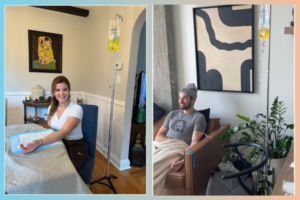
Who Can Administer Mobile IV Therapy? Ensuring Safe and Professional Care
September 11, 2024
In recent years, mobile IV therapy has become a popular wellness service for those seeking convenient health support. Whether it’s for hydration, immune boosting, or recovery after a big night out, mobile IV therapy allows individuals to receive personalized treatments in the comfort of their own homes.
As with any medical treatment, ensuring the procedure is carried out by a qualified professional is crucial. Who can administer IV therapy in a mobile setting? This question is essential because safety and effectiveness depend on the skills and certifications of the healthcare provider. Qualified professionals are trained to handle the complexities of IV therapy and respond to any potential complications.
What is Mobile IV Therapy?
Mobile IV therapy is a service that brings intravenous treatments directly to the patient, rather than requiring a visit to a hospital or clinic. IV therapy involves delivering fluids, vitamins, and other nutrients directly into the bloodstream through an intravenous drip, allowing for faster absorption and immediate benefits.
The convenience of mobile IV therapy lies in its flexibility and ease of access. Patients can receive hydration, vitamin infusions, or other wellness treatments without leaving their homes. This is particularly beneficial for people with busy schedules, those recovering from illness, or anyone who simply prefers the comfort of a home environment.
Additionally, mobile IV therapy offers personalized care, where the treatment is tailored to the patient’s specific needs. Whether someone is recovering from a hangover, boosting their immune system, or enhancing athletic recovery, mobile IV services can provide a customized approach to wellness, all administered by qualified healthcare professionals.
This convenience and comfort highlight the importance of understanding who can administer IV therapy in these settings to ensure a safe, effective treatment.
Who is Qualified to Administer Mobile IV Therapy?

Mobile IV therapy involves delivering fluids and essential nutrients directly into the bloodstream, which requires a skilled healthcare professional. But who can administer IV therapy in a mobile setting? Only licensed and trained professionals are qualified to perform this service to ensure safety and proper care.
Licensed Healthcare Professionals
In the realm of who can administer IV therapy, the answer includes a few key professionals. Typically, registered nurses (RNs) are the primary healthcare providers who administer IV therapy in mobile settings. However, other licensed professionals, such as paramedics and doctors, may also be involved, depending on the service.
- Registered Nurses (RNs): RNs are often the go-to professionals for administering IV therapy due to their extensive training in patient care and IV administration.
- Paramedics: In some cases, paramedics with the proper certifications may administer IV therapy, particularly in urgent care or wellness scenarios.
- Doctors: Although not commonly involved in day-to-day mobile IV therapy, physicians are responsible for overseeing the treatment plans and ensuring all protocols are followed.
State-Specific Regulations
The qualifications for who can administer IV therapy can vary depending on the state or region where the service is provided. Each state has its own regulations that govern IV therapy, including the types of professionals who are legally allowed to administer the treatment and what certifications they must hold.
- Some states require direct physician oversight, while others allow registered nurses to provide the service independently, as long as they hold the proper credentials.
- Certification requirements, such as IV therapy training and licensure, are crucial for all healthcare providers who administer IV therapy. These certifications ensure the professional is competent in both the technical aspects of IV insertion and the medical knowledge necessary to handle potential risks.
It’s essential for both providers and patients to understand the legal requirements in their specific state to ensure that mobile IV therapy is being administered by properly licensed professionals.
The Role of Registered Nurses (RNs) in Mobile IV Therapy
When considering who can administer IV therapy, registered nurses (RNs) are typically the most common professionals in mobile IV therapy services. Their medical expertise and hands-on training make them well-suited for this responsibility.
Why Registered Nurses are Often Chosen
Registered nurses are often chosen to administer IV therapy in mobile settings because of their thorough understanding of patient care. They are trained to handle various aspects of the treatment, including assessing patient health, performing the IV insertion, and monitoring the patient throughout the process. RNs have the knowledge to manage complications if they arise, making them essential to ensuring a safe and effective treatment.
Required Certifications for RNs
To administer IV therapy, RNs must hold specific certifications. These typically include:
- IV Therapy Certification: A specialized certification that teaches RNs how to insert IVs, manage equipment, and monitor patient responses.
- State Nursing Licensure: RNs must be licensed to practice in the state where they provide mobile IV services. This licensure verifies that they meet the necessary educational and clinical training requirements.
Patient Care and Risk Management in Mobile IV Therapy
During mobile IV therapy, RNs not only administer the treatment but also oversee patient care. They monitor vitals, ensure the proper flow of fluids, and adjust treatment as needed. Their role includes managing potential risks, such as allergic reactions or IV infiltration, and addressing these issues promptly to maintain patient safety.
Registered nurses’ ability to provide both medical expertise and compassionate care makes them a trusted option for administering IV therapy, particularly in mobile settings.
Who Can Administer IV Therapy?

Other Healthcare Providers Involved in Mobile IV Therapy
While registered nurses (RNs) are often the primary professionals administering mobile IV therapy, other healthcare providers are also qualified to deliver this treatment. Understanding who can administer IV therapy ensures that patients receive care from a knowledgeable and certified professional, even in mobile settings.
Paramedics
In addition to RNs, paramedics are also qualified to administer IV therapy in emergency settings. Paramedics are extensively trained in urgent care, which includes IV insertion and fluid administration, making them well-suited to handle the demands of an emergency scenario.
- Paramedics can deliver IV therapy in scenarios where immediate care is required, such as severe dehydration or sudden illness.
- Their expertise in emergency medical response makes them highly capable of managing potential complications that could arise during the treatment.
Physicians
Physicians play a critical role in overseeing who can administer IV therapy in mobile services. Although doctors may not typically administer the IV themselves, they provide essential medical oversight to ensure the safety and effectiveness of treatments.
- Physicians often guide the overall treatment process by creating or approving IV therapy protocols. They may also be involved in the initial patient consultation to determine the best course of treatment.
- In cases where more complex medical conditions are present, a physician may be consulted to assess whether IV therapy is safe and appropriate for the patient.
Physicians are crucial for ensuring that mobile IV therapy businesses comply with medical regulations and maintain high standards of patient care.
Why It’s Essential to Use a Qualified Professional for Mobile IV Therapy
Mobile IV therapy offers convenience and flexibility, but it is important to understand who can administer IV therapy and why proper qualifications are vital. Administering IV therapy involves more than just inserting a needle – it requires medical expertise and precision to avoid potential risks.
Importance of Proper Insertion Technique
Qualified professionals, such as RNs, paramedics, and physicians, have the training necessary to safely administer IV therapy. Proper insertion techniques are critical to prevent complications such as:
- Infection: Improperly sterilized equipment or incorrect insertion can introduce bacteria, leading to serious infections.
- Vein Damage: Incorrect needle placement can cause damage to veins, leading to bruising, swelling, or more severe complications.
- Allergic Reactions: Healthcare providers must be able to identify and respond to allergic reactions that could occur during IV therapy.
By ensuring that only qualified professionals administer the therapy, patients can feel confident that they are receiving safe and effective treatment.
Meet the Founders of Uplift IV Wellness
Brianna Atsu-Swanzy, BSN, RN
Brianna Atsu-Swanzy is a registered nurse with a BSN from Seton Hall University. She has over a decade of experience in nursing, having worked in surgical, oncology, and ICU settings. Her passion for holistic care and preventative medicine drives her commitment to providing high-quality mobile IV therapy services.
Natalie Marini, BSN, RN
Natalie Marini holds a BSN from Long Island University and has extensive experience in pediatric and adult ICU settings. Her background in trauma and cardiac care fuels her mission to help patients optimize their health through mobile IV therapy.
Choosing licensed, qualified professionals for mobile IV therapy is crucial for safe and effective treatment. At Uplift IV Wellness, professionals like Brianna and Natalie ensure that every patient receives expert care, tailored to their individual health needs. Contact us today to schedule your next mobile iv therapy treatment.